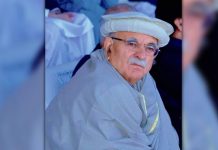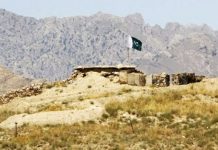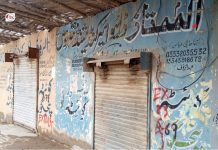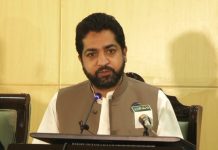Author: Abdel Sattar Bugti
I have studied english Arabic, Urdu, Sindhi, Hindi and Balochi languages. Similary I have also learnt Russian alphabets and reviewed the same in correlatiin with English using google translation facility. After studying and learning these languages I came to know that Balochi is the easiest language with minimum alphabets and it is also a formula based language.
In writing form, Balochi is the world’s most easiest language in field of all departments whether its singular, plural, modal verbs, verbs, adjectives and genders etc or it may be grammer. For example in Urdu we use a complete word for singulars example given (e.g)
- آپ کے پاس ایک گھر ہے۔
However, for Balochi we use just an alphabet which is also integrated with word. - ترا لوگے ھست۔
Means just “ے” and “یے” are used to show singleness
کتابے، بُزے، بیرکے( A flag) ءُ سنگتے
If word ends with “ا”, “ی” and “ے” then we use “یے” for singleness e.g
تو بلوچے ئے
(آپ ایک بلوچ ہو، You are a Baloch)
تو مری یے ئے
You are a Marri Baloch.
کاسم ناھُدایے
Qasim is a sailor
اِے چے یے؟
What is this?
اے ماڑی یے
This is a building
In plural, for many things we use only “اں” in Balochi such as e.g.
کتاباں، سنگتاں ءُ دزگْوھاراں(سہیلیاں)
However, Urdu is hard and complicated in this department
- آپ ان کتابوں کو کیا کرو گے؟
تو اِے کتاباں چے کن ئے؟ - یہ کتابیں وہاں رکھو
اِے کتاباں اود ءَ ایر کن۔
Means in urdu multiple forms are used for plural such e.g.
سہیلی، سہیلیوں۔۔۔ اور سہیلیاں
مصیبت، مصیبتوں، مصیبتیں اور مصائب
لڑکا، لڑکے۔۔۔۔ اور لڑکوں
If we see adjective words where English uses “ful, ous, tive and nal” a major signs such as
Beatiful home, careful player, Dangerous work, Gorgeous Lady, Active student, Progressive, Leader, Emotional girl mad dog and bad boy.
However in Balochi we just use “یں” and “ئیں” for adjective words e.g.
وشیں لوگ، شیواریں لیبی، بیمناکیں کار، بدیں بچک ءُ جُھدکاریں نودربر
If a word ends with “ا, و, ی, and ے” then we use “ئیں” for adjectives e.g
زیبائیں جِنکّ، وشبوئیں پُل، گری ئیں بینگ(mad dog) ءُ سے ئیں شکاری۔
For present second singular and plural person english uses only word “you” which is sometimes very disturbing and confusing. Lets see below sentences translated in Balochi and Hindi
You are going.
تو روگ ءَ ئے، آپ جا رہے ہو۔
In the above sentence second person is one. It is strange that same sentence is also used for present many persons as well e.g.
You are going
شُما روگ ءَ اِت، آپ لوگ جا رہے ہیں
To be well noted that this problem is also unsolved with Hind/Urdu as well such e.g.
آپ جا رہے ہو، آپ جا رہے ہیں، تم جا رہی ہو۔۔۔۔
Similarly english uses “He, she and It” as pronouns while Balochi uses just an alphabet “آ” for this. E.g.
He \ She is writting a letter
آ نمدی یے نبیسّگ ءَ اِنت۔
English uses huge sized different words like herself, himself, myelf themselves and ourselves while in Balochi we use only one word made up of just two alphabet “وت” which is very legal to all.
I do work myself for my children
من پہ وتی چُکاں وت کار کن آں۔
They are struggling for themselves
آ پہ وت ءَ جُھد کنگ ءَ اَنت۔
similarly for “her, his, me, us and their” only “وتی” is used.
He has lost his bike keys
آئی ءَ وتی پرپٹ ءِ کلیت گار کُتگ اَنت۔
For second person we only use “ئے” while Hindi is complicated in this regard such as
- تو رو ئے(آپ جاو گے/ جائیں گے، تم جاو گے یا آپ جائیں گے۔۔۔and آپ جاو گی)
- تو نِند ئے۔
- تو بلوچے ئے۔
For third person singular we use a small word”ئِے” which is well legal to all living and non-livings as well. However Hindi and English do not have such facilities example given (e.g.)
- من ءَ گْوشت ئِے۔ (اِس نے یا اُس نے مُجھے بتایا)
- کار ایت ئِے۔ (وہ اُس کو لائے گا\ لائے گی)
- آپ ئِے وارت ءُ شُت۔
- گْراد ایت ئِے۔ (وہ اِس کو پکائے گی)
In the same way for first person, means for “I”, “We” and many “You” Balochi language has well established Helping Verbs like “آں”, “اِیں” and “اِت” respectively e.g
- من رو آں، من نِند آں ءُ من بلوچے آں
- ما رو ایں، ما نِند ایں ءُ ما بلوچ ایں۔
- شُما رو اِت، شُما نِند اِت ءُ شما بلوچ اِت۔
While Hindi uses گا، گی and گے etc for Future Tenses. Even Balochi is also very simple in field of tenses where sense of understanding is naturally produced - واجہ کاسم کتاب وان ایت۔
Mr. Qasim will study the book.
Now occasionally, the similar sentences also are used for present indefinite tenses e.g
ھو برے برے واجہ کاسم ھم کتاباں وان ایت۔
Yes sometimes Mr. Qasim also studies the books.
- بانُک لیلہ گُداں شود ایت۔
Mis.Leyla washes cloths/Mis. Leyla will wash cloths
Means the matter of such complex tenses are naturally solved out according to environment of discussion.
In Past Continuous and Past Simple Tenses Hindi uses “تھا، تھے، تھیں, and تھی” and even some other hard tactics. Similarly English uses “was, were and second & third form of words While Balochi uses only “ات” to handle such stupidity
- آ وانگ ءَ ات۔
وہ پڑھ رہی تھی/ پڑھ رہا تھا۔ - من روگ ءَ ات آں۔
میں جا رہا تھا
I was going - تو دْرچک گُڈ ات۔
آپ نے درخت کاٹا
You chopped down the tree.
In case of Present Perfect Tenses urdu uses different type of several words like “چُکا تھا, چُکے تھے and چُکی تھیں which are made up of several alphabets as well. Same headache exists at english as well using “has and have” with third form of verbs while Balochi uses just “تگ” integrated with verb e.g
- ھور ءَ گْوارتگ۔
بارش برس چُکا ہے۔
It had rained. - تو زاناں کُج ءَ گار بیتگ ئے؟
آپ کہاں غائب ہو چُکے تھے؟ - وتی چُک وانینتگ اَنت ئِے۔
He has got his children taught up.
Based on above all very few justifications it is being sincerely concluded that in field of literature Baloch national language is world most easiest language in the world. Unfortunately our language is not being taught in schools and colleges. However, we all are very hopeful that a time shall definitely come when Balochi and Brahvi languages will be taught in schools, colleges and Unversities. Additionally our national languages will have every type of facilities like news papers, cinema and television broadcasting corporations. God willing.
Disclaimer: The views and opinions expressed in this article are those of the author and do not necessarily reflect the official policy or position of The Balochistan Post or any of its editors.





























